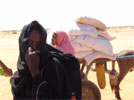
Despite complaints of ineffectiveness, last week the Somali Transitional Federal Parliament, or T.F.P., voted in favor of a three-year extention to its original mandate set to end in August. The parliament is part of the Transitional Federal Government of Somalia, or T.F.G., that was established in 2004 and tasked to administrate a five-year political transition. However to date, the T.F.P. has passed no laws and, arguably, its greatest achievement has been refurbishing the parliament building.
Parliament voted almost unanimously in favor of the extension, which would only extend the mandate of the parliament, excluding the rest of the transitional government. "Parliament will carry out huge reforms in order to serve the people of Somalia," Speaker of the T.F.P. Sharif Hassan Sheikh Adan explained. "This is a victory for future Somali democracy."
Many critics, however, do not share this view. Somalia's National Reconciliation Committee has asked the Somali MPs to reconsider and cancel their decision.
The decision to extend the mandate was made without key consultation or discussion with the T.F.G.’s main supporters—including the U.N. and U.S. This seemingly unilateral decision has ignited major criticism from the international community and human rights activists, questioning motives behind the T.F.P.’s extension.
According to the New York Times, the U.S. has described the decision as “self-serving political maneuvering” that has resulted in “a disservice to the people of Somalia and a setback to the establishment of legitimate and effective government.”
Last week the U.N. also voiced similar concerns, expressing disappointment in the lack of consultation that has taken place on how to end Somalia’s political transition. “The Somali people deserve and expect to see change. It is the responsibility of the TFIs [transitional authorities] to implement this change in consultation with major entities representing the Somali people and key partners of the international community,” Secretary-General Ban Ki-moon’s Special Representative for Somalia Augustine P. Mahiga, said in a statement.
The rest of the T.F.G.’s mandate will still expire in August, but it remains uncertain what will replace the transitional government. Mahiga argued that between now and the expiration date, several tasks must take place—mainly reconciliation efforts, building civilian and security institutions, and the constitution-making process.
Somalia has been without an effective centralized government since 1991, a void that has facilitated the continued factional conflicts and bloodshed that have devastated the country. Just last week at least 15 people were killed, and 50 injured during clashes among T.F.G. security forces in southwest Mogadishu. “We are appalled by the loss of civilian lives and the complete disregard shown for their safety,” UNHCR reported. The fighting is part of a continued pattern of violence that has carried over from 2010, which according to the U.N. was the worst year in a decade for civilian casualties in Mogadishu.
Photo: Displaced Somali women.

